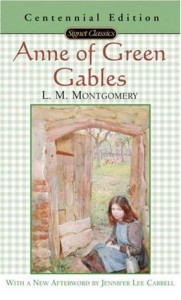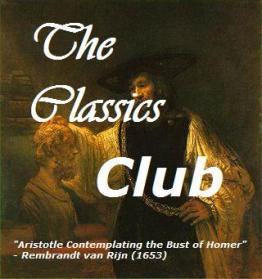 Montgomery, Lucy Maud. Anne of Green Gables
Montgomery, Lucy Maud. Anne of Green Gables
Original publication date: 1908
Like most young girl characters who appear in books written for girls, Anne Shirley of Anne of Green Gables functions for readers as a model of how to be a successful girl. These books communicate and reinforce to children the beliefs and behaviors that society deems appropriate for them to emulate. These messages may be submerged within a colorful narrative, but they are nonetheless there for youngsters unconsciously learning how to fit in and succeed in their world.
I know that I read Anne of Green Gables as a child, and I’m sure that I saw Anne as someone I should emulate. Also, Anne’s acquisition of a loving family is a theme that intrigued me throughout my own unhappy childhood. (I was fascinated at how all the Mouseketters managed to live with Jimmy and Uncle Roy in such harmony in their house on The Mickey Mouse Club.) Yet I don’t remember at all how I felt at the time about Anne or how I reacted to her story.
But on recently rereading the book, I felt a much greater affinity for Marilla than for Anne. This isn’t unreasonable, since now I resemble Marilla, not the young Anne. I was pleasantly surprised to discover how Montgomery includes in the book the growth of Marilla as much as the growth of Anne.
Early in Anne’s life at the Cuthbert farm (Chapter XI), Anne gives Marilla her opinion on the minister’s Sunday text and sermon:
It was a very long text. If I was a minister I’d pick the short, snappy ones. The sermon was awfully long, too. I suppose the minister had to match it to the text. I didn’t think he was a bit interesting. The trouble with him seems to be that he hasn’t enough imagination.
And here’s how Marilla reacts:
Marilla felt helplessly that all this should be sternly reproved, but she was hampered by the undeniable fact that some of the things Anne had said, especially about the minister’s sermons and Mr. Bell’s prayers, were what she herself had really thought deep down in her heart for years, but had never given expression to. It almost seemed to her that those secret, unuttered, critical thoughts had suddenly taken visible and accusing shape and form in the person of this outspoken morsel of neglected humanity.
Although Marilla secretly agrees with Anne, she has never had the gumption to say so. Marilla herself has been successfully socialized into what society considers proper behavior. However, Marilla at least can recognize the truth of what Anne says, even though she takes seriously her job of teaching Anne how to be polite.
Gradually Marilla softens toward Anne. When Anne hurts her ankle while playing at her friend Diana Barry’s house and Marilla sees Mr. Barry carrying Anne home (Chapter XXIII):
At that moment Marilla had a revelation. In the sudden stab of fear that pierced her very heart she realized what Anne had come to mean to her. She would have admitted that she liked Anne—nay, that she was very fond of Anne. But now she knew as she hurried wildly down the slope that Anne was dearer to her than anything else on earth.
Marilla begins to admit to herself her love for Anne, even though she doesn’t know how to express it:
The lesson of a love that should display itself easily in spoken word and open look was one Marilla could never learn. But she had learned to love this slim, gray-eyed girl with an affection all the deeper and stronger from its very undemonstrativeness. Her love made her afraid of being unduly indulgent, indeed. She had an uneasy feeling that it was rather sinful to set one’s heart so intensely on any human creature as she had set hers on Anne, and perhaps she performed a sort of unconscious penance for this by being stricter and more critical than if the girl had been less dear to her. Certainly Anne herself had no idea how Marilla loved her. (Chapter XXX)
When Anne grows taller and needs new clothes, Marilla laments her growing up:
Marilla felt a queer regret over Anne’s inches. The child she had learned to love had vanished somehow and here was this tall, serious-eyed girl of fifteen… Marilla loved the girl as much as she had loved the child, but she was conscious of a queer sorrowful sense of loss. (Chapter XXXI)
Later, Anne tells Marilla that she will always love her and Matthew:
Marilla would have given much just then to have possessed Anne’s power of putting her feelings into words; but nature and habit had willed it otherwise, and she could only put her arms close about her girl and hold her tenderly to her heart, wishing that she need never let her go. (Chapter XXXIV)
It isn’t until Matthew’s death near the end of the book that Marilla can finally tell Anne:
Oh, Anne, I know I’ve been kind of strict and harsh with you maybe—but you mustn’t think I didn’t love you as well as Matthew did, for all that. I want to tell you now when I can. It’s never been easy for me to say things out of my heart, but at times like this it’s easier. I love you as dear as if you were my own flesh and blood and you’ve been my joy and comfort ever since you came to Green Gables. (Chapter XXXVII)
By the end of the book, then, Marilla has learned not only how to love, but also how to express her love. Marilla and Anne both grow through their interaction with each other throughout the novel.


Pingback: Blog a Day Challenge: March Report | Retreading for Retirement